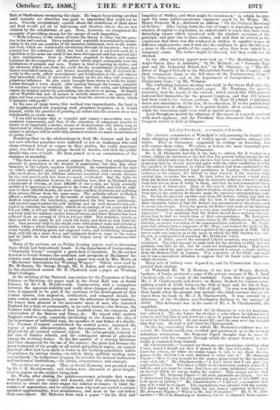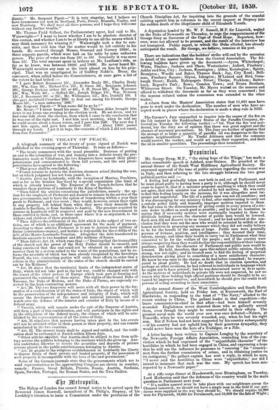ELECTORAL CORRUPTION.
The election commission at Wakekeld is still pursuing its inquiry and daily obtaining fresh evidence of widely spread corruption among,t the voters. That at Gloucester suspended its sittings on Saturday, but will resume them today. We select, as before, the most important por- tions of the evidence taken at Gloucester.
Mr. A. H. Phillpotts had felt it his duty to address Sir R. Carden in a letter, calling his attention to the fact that the general belief among the re- spectable inhabitants was, that his election had been carried by bribery, and proposing that he should meet and agree with the other candidates to refer the question of the manner in which the contest had been conducted to the arbitration of a disinterested legal gentleman in London, who should take evidence on the subject, Sir Robert to bind himself, if the decision went against him, to resign his seat. To that letter he received a brief reply from Sir Robert Carden, stating that he sincerely believed witness's allega- tions had not an atom of truth in them, and that he had transmitted them to his agent at Gloucester. Hurt at the way in which his overtures had been met, he wrote again to Sir Robert Carden, stating that unless he heard from him to the contrary he should make the previous correspondence pub- lic. To this he received another note from Sir Robert, telling him that he had sent witness's second letter, like his first, to his agent at Gloucester. Had charitably believed that Sir Robert was unconscious of the means used to secure his return. From the speech Sir Robert had made on the hustings witness thought he must either be a very pure candidate or " a consummate hypocrite." Was surprised that Sir Robert should have stated in his evi- dence that he had no recollection of that correspondence. Mr. Lovegrove said that in consequence of the course taken by Mr. Phillpotts at a previous election, no notice was taken of the communication referred to. Mr. Phill- potts had always been a supporter of Mr. Hope, and behind the backs of the Conservatives at Gloucester he had negotiated the agreement of 1852. Had never made any inquiry as to the mode in which the 1857 election was con- ducted, in consequence of receiving Mr. Phillpotta' letter. Mr. W. P. Price, one of the unseated Liberal members, was recalled and examined. The total amount he paid, both for the election in 1857, and the petition, was 7411. 2e. 5d., but he could not distinguish them. Had never in his life asked for, and never would condescend to accept, a single shilling from the Reform Club in London. Was a member of the Club, and must say it was a monstrous delusion to suppose that its funds were applied to- wards elections.
Many acts of bribery were deposed to, and the Commission then sus- pended their sittings.
At Wakefield Mr. W. B. Denison, of the firm of Messrs. Beckett, bankers, of Leeds, produced a copy of the private account of Mr. J. Barth Charlesworth, the cousin of the candidate. From this it appeared that Mr. J. B. Charlesworth had drawn on Messrs. Beckett for various sums, making a total of 47501. between the 16th of April and the 5th of May. The account was opened on the 11th of April. No sum was deposited in their hands when the account was opened—the whole amount was an ad- vance from the bank to Mr. J. B. Charlesworth. It was covered by a debenture of the Stockton and Darlington Railway to the amount of ' 50001. This debenture was in the name of Mr. J. D. Charlesworth, the candidate.
Thomas Stead, baker, was offered 401. by Sharpley to vote for Leathern, but refused it. The day before the election a man whom he did not know came in and told him to put down on a piece of paper how much he wanted to vote for Charlesworth. He put down 601., and the man next day brought him that sum. He took it and voted for Charlesworth.
On the day succeeding that on which Mr. Denison's evidence was re- ceived, Mr. Charlesworth was recalled and questioned as to the railway debenture transaction. Mr. Sergeant Pigott thought that he must be acquainted with the channels through which the money flowed, as vir- tually it emanated from himself. Mr. Charlesworth—" I cannot say from my own knowledge, but from what I have heard I should say that it passed to Mr. Jose Fernandez. I don't know for certain, for when my cousin began to talk to me about the ex- penses of the election I at once declined to enter into it." Mr. Sergeant Pigott—" How do you account for the money going round by the circuitous route of Leeds." Mr. Charlesworth—" I don't know that I can give any explanation of that. You know a little of electioneering matters yourself, I believe, and you must be aware that there are many incidental expenses at an election which do not go before the auditor. This money was for that purpose." Mr. Sergeant Pigott—" All such payments are illegal. Are we to understand that you did not contemplate that any part of this 50001. was to be spent in bribery ?" Mr. Charlesworth—" I did not contemplate that any- of it would be so- spent. The expenditure was optional with my cousin. Nor did I expect to be held liable for any money expended in bribery." Mr. Sergeant Pigott—" Where is Mr. Jose Fernandez ? " Mr. C. W. Fer- nandez—" He is in Hamburg on business, but he is expected home imme-
diately." Mr. Sergeant Pigott—" It is very singular, but I believe we have summonses out now in Scotland, Paris, Jersey, Brussels, Naples, and now Hamburg. We shall want all these persons, and I hope they will come without any further trouble."
Mr. Thomas Field Gilbert, the Parliamentary agent, had said to Mr. Wainwright—" I want to know whether I am to be absolute director of this contest, and whether I am to be at liberty to use all the means which I may think necessary for winning it." Wainwright took a day to con- sider, and then told him that the matter would be loft entirely in his hands. He received through Messrs. Overend and Gurney 20001., in three separate parcels, which were laid on his table by some unknown person. The price of votes ran from 101. to 501. Generally it was more than 25/. The total amount spent in bribery on Mr. Leatham's side, as far as he knew, was between 18001. and 19001. He never heard Mr. Wainwright mention any sum as the limit placed on him by his prin- cipal. That was an unmitigated lie of Godfrey Noble's. Brear, the canvasser, when called before the Commissioners, at once gave a list of the voters he had bribed:— "I gave Robert Beaumont 251., Alexander Brady 301., Charles Brady 301., Win. Cass 301., Michael Cox 251., E. Owen 501., Benjamin Johnson 20/., George Perkins either 351. or 40/., J. H. Steed 201. 'Wm. Warrener 351., Wm. Wells 401., Gifford 301., Joseph Briggs 151., Wm. Newsom 151., J. Beaumont 201. or 25/., Mr. Williamson 151., Mrs. Dunhill 101. I also gave Archibald Crowther 2001. to deal out among his friends, George Moore 351., ' a man unknown' 5001."
Mr. Sergeant Pigott—" What name did he go by ?" Mr. Brear—" I never heard his name. Mr. Thomas Alder brought him down to my house one evening in the election week. He sat down, and we had some talk about the election, from which I came to the conclusion that he was one of the right sort. I met him next morning, when he told me he could secure about a dozen voters, and I gave him 2501. The next day I met him again, and gave him another 250/. . . . About 13001. passed through my hands. I got it in bags, the contents of which I did not count, from Jose Fernandez."



























 Previous page
Previous page